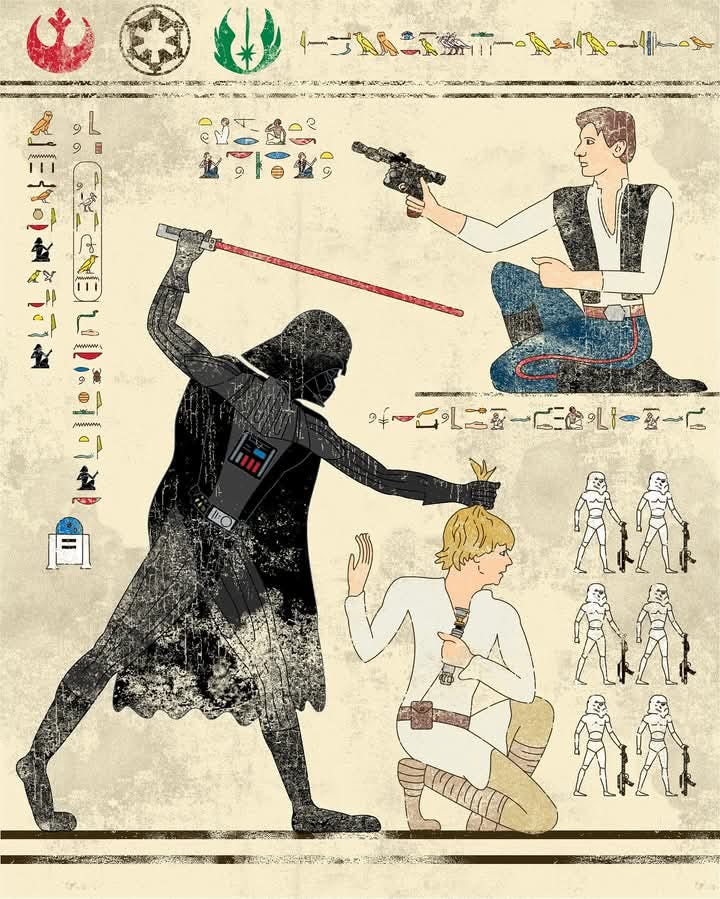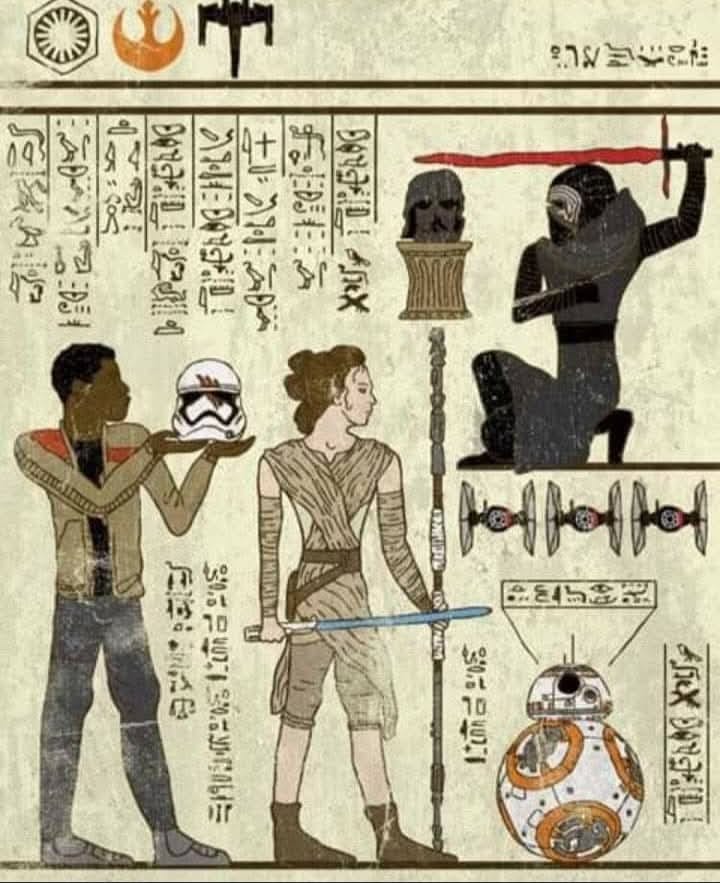“A Long Time Ago in a Galaxy Not So Far Away”...
Theological Reflections on Star Wars and Biblical Themes
Few cinematic movies have captured the imagination of audiences like Star Wars. I remember as a lad in 1977 when I saw it in the theater, its triumphant opening music and horns announcing a new space age. Its impact gripping you in your seat as the first words moved across the screen, "A long time ago in a galaxy far, far away....".
With its sweeping mythology, cosmic battles, and deeply personal stories of redemption, the saga shadows ancient truths that stretch far beyond the boundaries of science fiction. Though George Lucas’s inspiration drew heavily from mythologist Joseph Campbell and Eastern philosophies, the narrative arc of Star Wars resonates powerfully with Judeo-Christian themes. From the battle between good and evil to redemption, sacrifice, and prophecy, the theological parallels invite thoughtful reflection from a biblical perspective.
At the heart of Star Wars lies the eternal struggle between the Light and Dark sides of the Force. This dualism is more than dramatic conflict—it’s a moral and spiritual battleground. The Jedi embody patience, self-control, and peace, while the Sith are consumed by fear, hatred, and the lust for power.
Scripture, too, describes a cosmic conflict. The Apostle Paul wrote of a war "not against flesh and blood but against the spiritual forces of evil in the heavenly realms" (Ephesians 6:12). Light and darkness are common motifs throughout the Bible, with Christ himself declared as "the light of the world" (John 8:12). As the Jedi commit themselves to the light, Christians are called to “walk in the light as He is in the light” (1 John 1:7).
The prophecy of the Chosen One is central to the Star Wars narrative. Anakin Skywalker, believed to be the one who would bring balance to the Force, succumbs to darkness before ultimately being redeemed. His journey mirrors the archetype of the messianic figure—the one foretold, misunderstood, fallen, and yet ultimately victorious.
This pattern strongly resembles the biblical arc of the Messiah with a major exception- Jesus never sinned nor did he fall. Jesus Christ, foretold by the prophets, came not as many expected, but through humility, suffering, and triumph over sin by his death on the cross but more importantly his resurrection from it. Romans 5 draws a powerful comparison between Adam, whose disobedience brought death, and Christ, whose obedience brought life. Interestingly, Anakin functions as both—a figure whose fall brings darkness, but whose redemption restores hope, echoing the biblical tension between the first Adam and the second.
Anakin’s descent that transforms him into Darth Vader is driven by a seductive promise: the ability to save the ones he loves from death. The Emperor tempts him with fear, power, and control—echoing the serpent’s offer in Eden, “You will be like God” (Genesis 3:5). This fall from innocence into moral corruption is as old as humanity itself.
The Bible presents temptation as a defining aspect of human experience. Both Adam and Jesus were tempted—Adam falls; Jesus does not (Matthew 4). The road to the Dark Side in Star Wars follows a familiar biblical warning: unchecked desire, once conceived, gives birth to sin (James 1:14–15).
Redemption: Even Darth Vader Can Be Saved
One of the most powerful theological notes in Star Wars is the redemption of Darth Vader. Despite his crimes, his son Luke refuses to give up on him. In an act of faith and love, Luke risks everything to draw his father back from the abyss. In the end, the darkness is undone not by vengeance, but by compassion and love.
This resonates deeply with the Christian doctrine of grace. Romans 5:8 tells us, “While we were still sinners, Christ died for us.” Like the Prodigal Son, Vader returns in the final moments, accepted not because of merit, but because of love. His story reminds us that no soul is too far gone for redemption.
In Episode IV, Obi-Wan Kenobi willingly sacrifices himself so Luke and the others can escape. Later, Luke offers his life in hopes of redeeming his father and saving the galaxy. These acts are not just noble—they’re redemptive.
Such sacrificial love lies at the core of the Christian faith. Jesus says, “Greater love has no one than this: to lay down one’s life for one’s friends” (John 15:13). The Cross itself is the ultimate sacrifice—the omnipotent, omniscient, and omnipresent God-man dying for His creation to save a fallen world.
The Force and the Spirit
The Force, described as an energy that binds all living things, evokes a sense of spiritual interconnectedness. While the Force is impersonal and dualistic, its presence evokes a kind of mysticism akin to the role of the Holy Spirit in the Bible. Jedi must train themselves to be sensitive to its prompting, to listen and respond in humility and trust.
The Bible presents the Holy Spirit not as an energy but as a personal guide and comforter. Jesus told his followers that the Spirit would “guide [them] into all truth” (John 16:13), empowering them to live transformed lives (Romans 8:9–11). Though the theology is different, the idea of a spiritual force prompting moral action echoes Christian spirituality.
Prophecy and the Mystery of Fulfillment
The Star Wars universe is shaped by prophecy—a foretelling of one who would bring balance to the Force. Yet this prophecy is misunderstood and appears to be fulfilled in an unexpected way. Anakin’s fall into darkness seems to contradict the prophecy until his final act of redemption.
This theme of misunderstood prophecy and paradoxical fulfillment mirrors the biblical narrative. The Jews of Jesus’ day anticipated a conquering king; instead, they received a suffering servant. The Messiah came not to overthrow Rome, but to conquer sin and death. Like Anakin’s arc, biblical prophecy unfolds in mystery and God’s divine timing.
Final Thoughts
Though Star Wars is not a Christian allegory, its narrative structure reflects spiritual undertones and themes that resonate deeply with christian theology: light against darkness, fall and redemption, sacrifice and hope.
So the next time you see the film Star Wars, consider that in a universe shaped by the Force, we are reminded that power must be used for good, that temptation must be resisted, and that even the darkest soul can be redeemed. As Christians, we see in these cinematic reflections of the true story—the story of a world broken by sin, a Savior sent, and redemption made possible through God’s love for us.
May the 4th be with you today..
No, may God be with you- in spirit and in truth. All you you.
All of us..
God bless
Thank you for reading Dr. Aaron Judkins Substack. Your subscription supports my work and allows me to bring you more articles like this.
As a token of our appreciation, we're offering you a limited-time offer of 20% off a paid subscription for your first year.
Thanks again for reading.
PS. If you loved this article, be sure to head over to our Ancient Pathways Patreon site and check out the “Hunt for the Red Heifers” on Coast to Coast AM.
PSS. If you liked this post, you may enjoy reading
Evidence of the Resurrection
The accounts of the death and resurrection of Jesus of Nazareth, as detailed in the New Testament, occur within the historical context of first-century Jerusalem. The New Testament writers consistently maintain that Jesus lived, died, and was witnessed alive post-resurrection. The apostles were mindful of potential skepticism and emphasized the reliabil…







